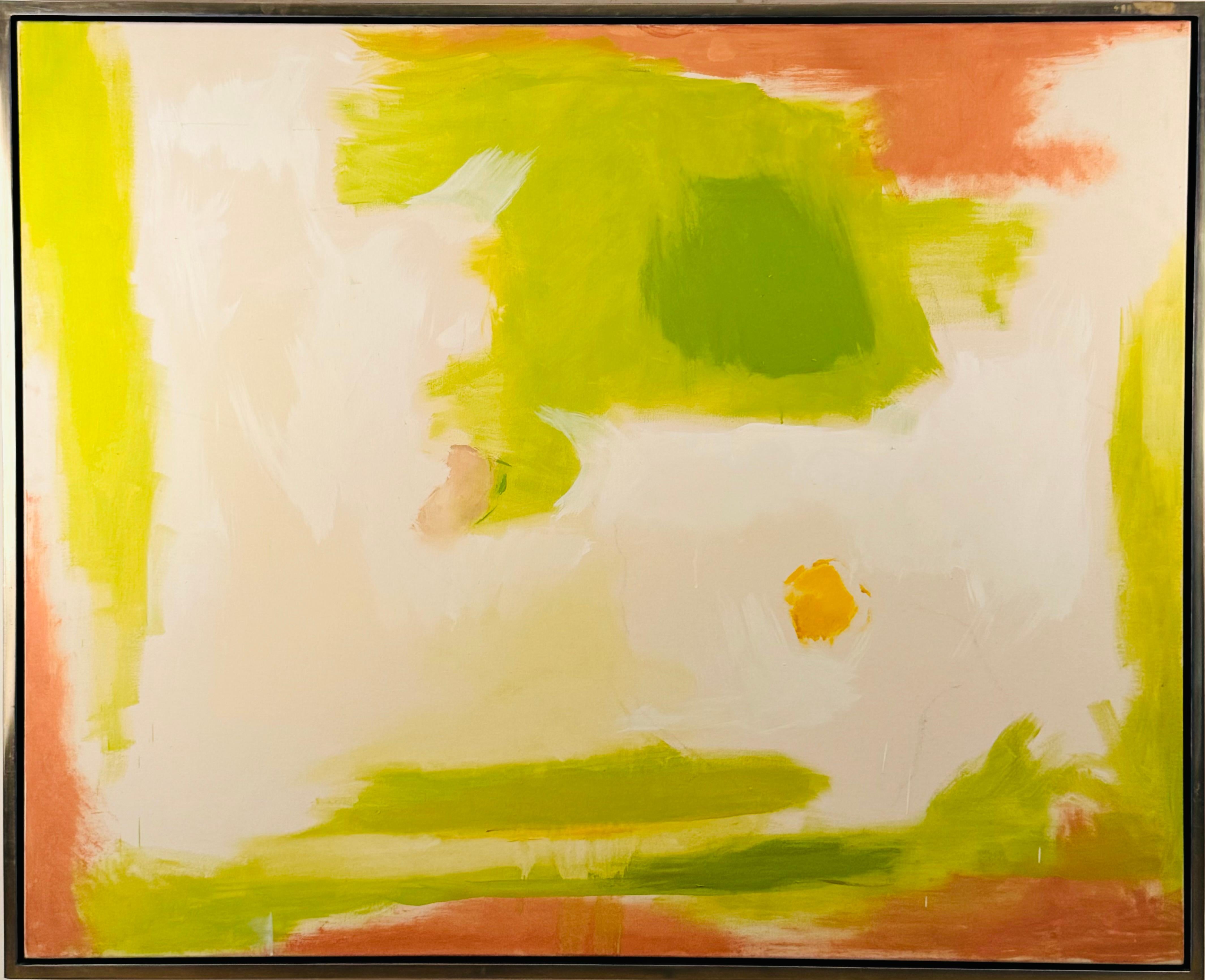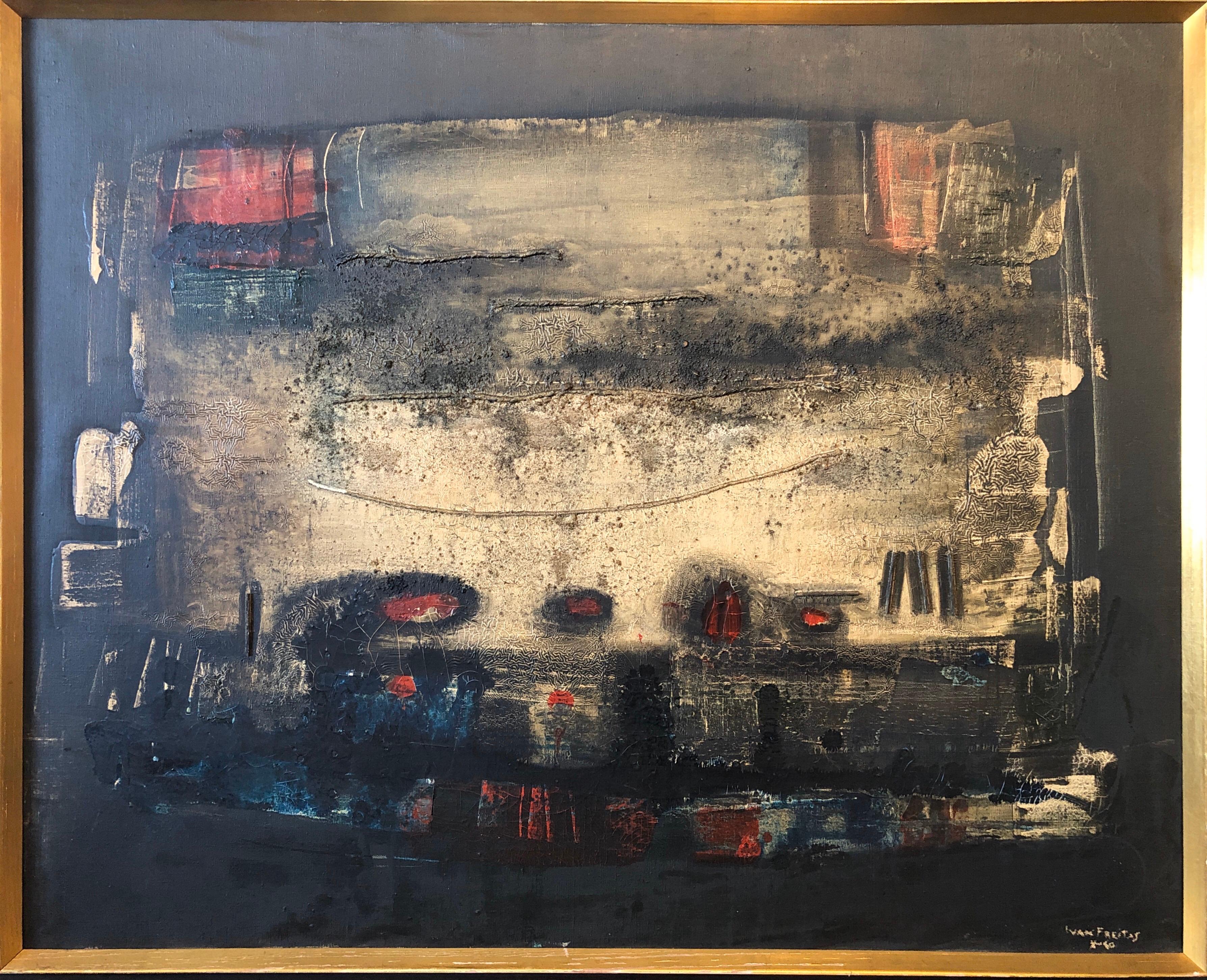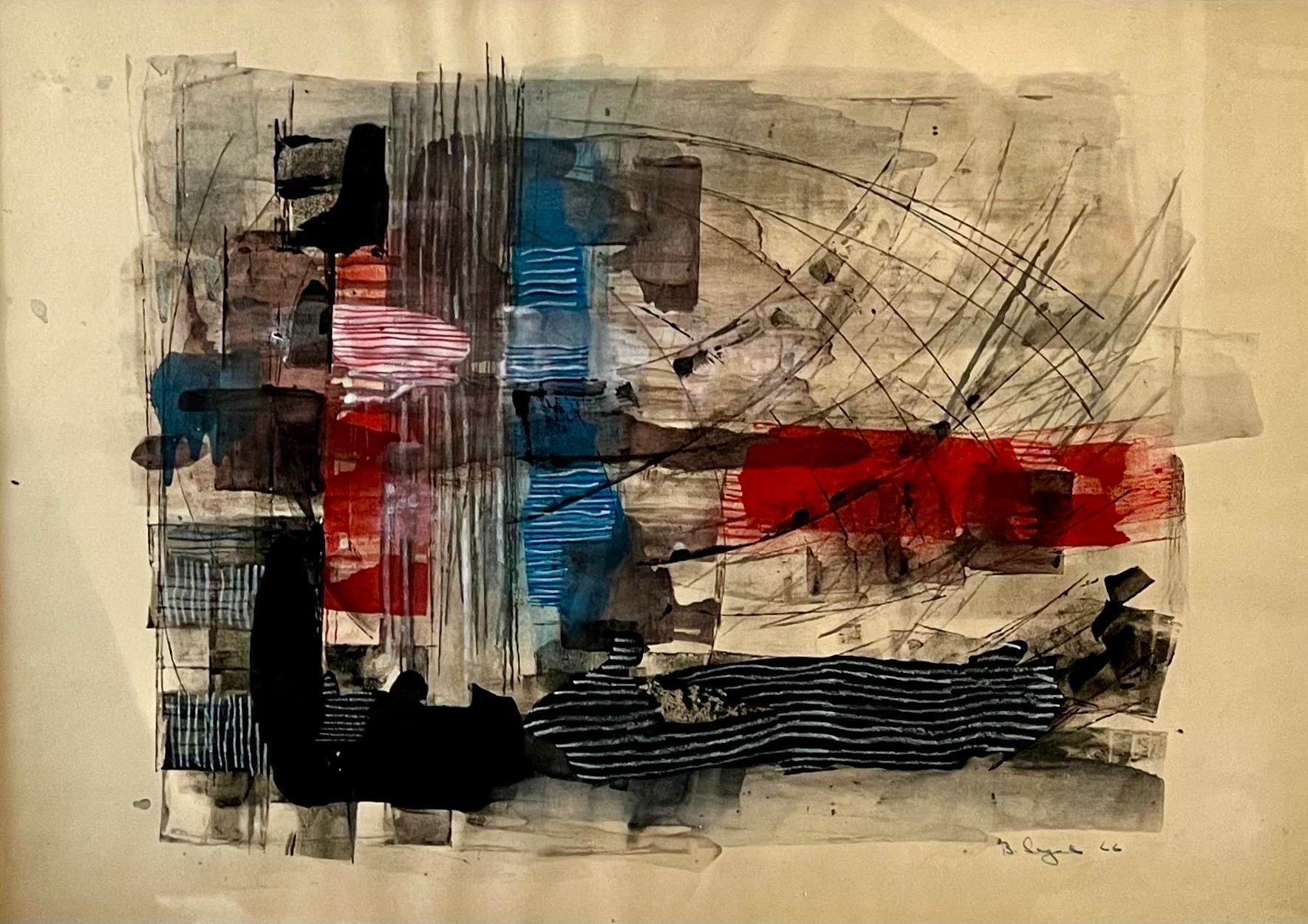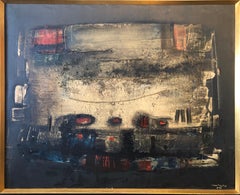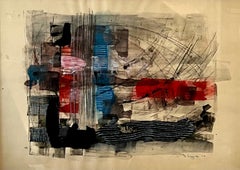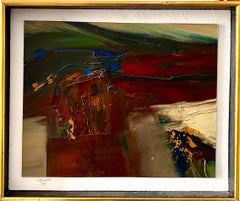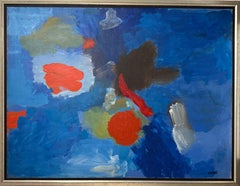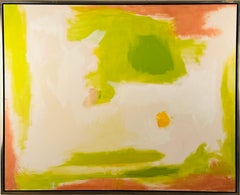Items Similar to French Argentine Modernist 74.47 Abstract Expressionist Painting
Want more images or videos?
Request additional images or videos from the seller
1 of 8
Sergio de CastroFrench Argentine Modernist 74.47 Abstract Expressionist Painting1974
1974
$2,800
£2,123.62
€2,439.06
CA$4,011.39
A$4,416.24
CHF 2,257.15
MX$52,709.03
NOK 28,738.35
SEK 26,892.68
DKK 18,218.39
About the Item
Sergio de Castro (15 September 1922 – 31 December 2012) was a French-Argentinian
Sergio de Castro was born in Argentina, in an aristocratic family of Spanish origins (Galicia and the Basque Country), the House of Castro. His father was a diplomat, which is why, from 1923 until 1932, Castro lived in Switzerland with his parents and his two sisters. During these years he visited cities like Lausanne, Geneva and Turin.
In 1933 he entered a Jesuit school in Montevideo and he started studying music. He discovered poetry by learning to speak and write in Spanish. He was specially touched by the works of César Vallejo. Through the years Castro would become close friends with writers like Octavio Paz, Julio Cortázar, Samuel Beckett, Kostas Papaioannou and Georges Schéhadé. Later, during a trip to Uruguay, he met Joaquín Torres García, with whom he studied painting and monumental art from 1941 until 1949. In 1942 he moved to Argentina, where he would live until 1949. Castro was also friends with other artists like Nikos Hadjikyriakos-Ghikas, Maria Helena Vieira da Silva and Arpad Szenes.
In 1945 he found a job as a secretary in the Astronomy Observatorium of the city of Córdoba, where we also worked as the assistant to the musician Manuel de Falla in Alta Gracia, until his death in 1946. In 1945 and 1946 he had a grant from the French government to study musical composition. During the year of 1946 he had an exhibition in New York City among other members of Torres Garcia's workshop. That same year he traveled to the northeast of Argentina and the south of Perú to study pre-columbian art with Gonzalo Fonseca, Julio Uruguay Alpuy and Jonio Montiel.
In 1949 he started teaching History of Music in the new music school of the city of La Plata. His work as a musician drew attention from relevant figures such as Wilhelm Furtwängler, Aaron Copland and Juan José Castro. He quit this job when he got a grant from the French government to improve his musical studies in Paris, where he settled in November 1949. Since 1951 he devoted himself exclusively to painting.
In 1955, his friend the German writer and translator Edith Aron introduced him to Julio Cortázar, who would become a close friend of him. Castro inspired the character of Etienne in Cortázar's novel Rayuela (Hopscotch). In the book is featured the intimate friendship of the protagonist, Horacio Oliveira, with his companion in the Serpent Club, whom he often visited in his studio in Paris. In 1960 he won the Hallmark Prize in New York. In 1979 he obtained the French nationality.
In 1980 he showed his works at the Argentinian pavilion in the 39th Venice Biennale. He was associate professor in the Human Sciences Faculty of the University of Strasbourg from 1981 until 1986. In 1997 he became Officer in the Ordre des Arts et des Lettres. In 2006, Sergio de Castro made a 220-work donation to the Fine Arts Museum of Saint-Lô. He was also a close friend of the musician Alberto Ginastera, who made reference to Sergio de Castro and his first works in his notes on modern Argentinian music. Castro died 31 December 2012 in Paris. He is buried in the Montparnasse cemetery, in Paris, close to his dear friend Samuel Beckett.
Monumental works
Two wall paintings for the Martirené Pavilion of the Hospital Saint-Bois (1942), in Montevideo (Uruguay), in collaboration with Joaquín Torres García and his disciples, among which Castro was the youngest.
The Creation of the Universe (1956–1958), 6m x 20m stained-glass window. Castro worked with painter and glass-maker J. J. K. Ray (1898–1979) in Paris.
Selected Exhibitions
1952 Galerie Jeanne Castel Paris
1954 Galería Bonino Buenos Aires and Galerie Pierre Loeb, Paris
1956 Galerie Rive Gauche, Paris
1958 Matthiesen Gallery, London
1959 documenta 2 Kunst nach 1945 Kassel
1961 Matthiesen Gallery, London
1963–64 Galeria Lorenzelli, Bergamo and Milano
1964 Galería Bettie Thommen, Basel
1965 Kunstverein Hamburg Retrospektive
1966 Musée d'Art et d'Histoire, Fribourg, Switzerland (retrospective)
1966 Recklinhausen, Variationen über ein Thema, Städtische Kunsthalle
1970 Retrospektiven in Oslo, Kunstforering, and Kunst Industriemuseet, Copenhagen, Kunstforening, Oslo, Kunstforening, Holstebro
1972 Wildenstein Gallery, London Landscapes of Light
1974 Galerie Jacob, Paris
1975 Kunsthalle Bremen, Retrospektive, Berlin Tempelhof, Kunstamt (Berlin Festival)
1975–76 Retrospective exhibition the Musée des Beaux-Arts de Caen (68 artworks from 1956 to 1966), France
1979 Hommage à Pierre Loeb, Musée d'Art Moderne de la Ville de Paris
1980 39th Venice Biennale
1987 French Institute London. Museo de Arte Moderno de Buenos Aires
1988 Galerie des Ambassades y Galerie Galarte, Sergio de Castro, Natures Mortes, 1958–1965. Paris/ Bayeux, Diocesan Museum of Sacred Art
1989 Galerie des Ambassades, Paris
1991–92 Romont, Swiss Stained Glass Museum (Castro Donation)
1995 Paris, Galarté Gallery
1997 Paris La Défense, Atochem
1998 Punta De Este, Sur Gallery, Punta del Este, Uruguay
2006–07 Saint-Lô, Normandy, exhibition of the Castro Donation
2008 Château de Gruyères, Switzerland, Sergio de Castro
2009 Museo Gurvich Montevideo, Uruguay, Francine Del Pierre and Fance Franck's Workshop, Paris
- Creator:Sergio de Castro (1922 - 2012, French)
- Creation Year:1974
- Dimensions:Height: 16 in (40.64 cm)Width: 37 in (93.98 cm)
- Medium:
- Movement & Style:
- Period:
- Condition:matted, not framed. size includes mat.
- Gallery Location:Surfside, FL
- Reference Number:1stDibs: LU38212571752
About the Seller
4.9
Platinum Seller
Premium sellers with a 4.7+ rating and 24-hour response times
Established in 1995
1stDibs seller since 2014
1,818 sales on 1stDibs
Typical response time: 1 hour
- ShippingRetrieving quote...Shipping from: Surfside, FL
- Return Policy
Authenticity Guarantee
In the unlikely event there’s an issue with an item’s authenticity, contact us within 1 year for a full refund. DetailsMoney-Back Guarantee
If your item is not as described, is damaged in transit, or does not arrive, contact us within 7 days for a full refund. Details24-Hour Cancellation
You have a 24-hour grace period in which to reconsider your purchase, with no questions asked.Vetted Professional Sellers
Our world-class sellers must adhere to strict standards for service and quality, maintaining the integrity of our listings.Price-Match Guarantee
If you find that a seller listed the same item for a lower price elsewhere, we’ll match it.Trusted Global Delivery
Our best-in-class carrier network provides specialized shipping options worldwide, including custom delivery.More From This Seller
View AllBrazilian Modernist Abstract Oil Painting Latin American Expressionist Concreta
Located in Surfside, FL
Abstract oil on canvas painting by Ivan Freitas.
25" x 31" inch canvas, framed to 30" x 36".
Bearing a Barcinski Art Gallery label verso and a second label stating that the painting was sold in 1961 at a benefit auction for the Albert Einstein Hospital held at the Museum of San Paulo.
Ivan Freitas was a Brazilian Postwar & Contemporary painter and Muralist (1932-2006)
Son of muralist Severino Araújo, Ivan started painting as a self-taught artist.
His first individual exhibition was at the Public Library, in 1957. With the success of the exhibition, he was able to move to Rio de Janeiro the following year, in 1958, where he came into contact with the work of artists such as Salvador Dali and Rene Magritte who influenced him. Between 1962 and 1963 he resided as a fellow in Paris. Between 1969 and 1972, he was on his second tour abroad, in New York City and commissioned by the International Telephone and Telegraph Corporation.
Back in Brazil, he painted a mural of over a thousand square meters on the external wall of the National School of Music in Rio de Janeiro in 1984 - the first of the Arte nos Muros Project. Still in the 70s, he married Dalva Mendes Gall whom he left after his death in 200, an extensive collection where one can find all the best works of this renowned Paraiba artist in Brazil and abroad.
The stay in New York, from 1969 to 1972, was perhaps the greatest turning point in Ivan's career. Until then, according to art critic Roberto Pontual, the plastic artist followed "a phase of abstraction close to the informal". In the United States , with so much technological influence around him, Ivan becomes interested in the machine and its movement mechanisms and inserts these perceptions in his works, as kinetic constructions with small motors hidden in boxes as Pontual defines, and also and triggering light patterns in cyclic and repeated series. (similar to the Op Art works of Julio le Parc and works by Yves Tinguely being shown at Rene Denis Gallery in Paris
In 1968, the magazine Galeria de Arte Moderna (GAM), published an article entitled Ivan Freitas and the Cosmic Space.
In the Brazilian Dictionary of Plastic Artists , the Italian art critic Giuseppe Marchiori refers to Ivan Frentas as someone who "controls and dominates each part of the painting with a desire to deepen the image that surprises and enchants". Still according to the critic, Ivan is someone who preserves the mystery in the harmony between lines and the colorful atmosphere, where he creates pauses and rhythms for the reading of his "secret structures". Arte Neo Concreta artists Lygia Clark, Helio Oiticica and Lygia Pape, were all contemporaries
The poet Ferreira Gullar writes: "Freitas does not turn to the subjective world, does not inquire into the arcana of the unconscious; he inquires into the future and, in the solitude of his paintings, promises us a serene and orderly world. And, if in his landscapes man does not appear, it is not that this order excludes him - it is that he has not yet reached it. "
Selec Solo Exhibitions
1957 - João Pessoa Public Library; João Pessoa, PB.
1960 - Ivan Freitas: Painting Exhibitions , at the Penguin Gallery; Rio de Janeiro - RJ.
1961 - MAM-BA , Salvador , BA.
1962 - Rubbers Gallery; Buenos Aires , Argentina .
1962 - La Cabana Galeria; Trieste , Italy .
1962 - Brazil-United States Cultural Institute; Rio de Janeiro - RJ.
1962 - Brazil-Uruguay Institute; Montevideo , Uruguay .
1962 - Barcinski Gallery; Rio de Janeiro - RJ.
1963 - Galleria Del Canale, Naples , Italy.
1963 - Ivan Freitas: Paris 1963, at the Barcinski Gallery ; Rio de Janeiro - RJ.
1964 - Barcinski Gallery; Rio de Janeiro - RJ.
1966 - Relief Gallery; Rio de Janeiro - RJ.
1968 - Relief Gallery; Rio de Janeiro - RJ.
1969 - Pan American Union; Washington , United States.
1971 - Miramar Gallery; New York, United States.
1971 - Bloomingdale's Art Gallery; New York, United States.
1973 - Individual, at Galeria Bonino; Rio de Janeiro - RJ.
1973 - Galeria Collection; São Paulo , SP.
1974 - Ivan Freitas: Paintings / Objectives , at the Rio de Janeiro Art Exchange; Rio de Janeiro - RJ.
1975 - Arte Global Gallery; São Paulo-SP.
1976 - Ivan Freitas: Paintings / Space / Movement , at Galeria Ipanema; Sao Paulo-SP.
1977 - Paulo Prado Gallery; Sao Paulo-SP.
1978 - Paraíba State Cultural Foundation; João Pessoa, PB.
1979 - Gallery B. 75 Concorde; Rio de Janeiro - RJ.
1980 - Individual, at Galeria do Sesi; Sao Paulo-SP.
1980 - Paulo Prado Gallery; Sao Paulo-SP.
1986 - Ivan Freitas: The Reinvented Landscape , at Galeria Arte Aplicada; Sao Paulo-SP.
1987 - Applied Art Gallery; Sao Paulo-SP.
1989 - Evasion Arte Gallery; Sao Paulo-SP.
1994 - GB Arte Gallery; Rio de Janeiro - RJ.
Select Group Exhibitions
1959 - 8th National Salon of Modern Art; Rio de Janeiro - RJ.
1960 - 9th National Salon of Modern Art; Rio de Janeiro - RJ.
1961 - 10th National Salon of Modern Art - jury exemption and critical award; Rio de Janeiro - RJ.
1961 - 6th São Paulo International Art Biennial , at the Ciccilo Matarazzo Pavilion; Sao Paulo-SP.
1963 - Art from America and Spain; Europe .
1963 - 2nd Youth Biennial; Paris, France.
1963 - 7th São Paulo International Art Biennial, at the Fundação Bienal; ; Sao Paulo-SP.
1964 - 2nd Art Summary of Jornal do Brasil, at MAM-RJ; Rio de Janeiro - RJ.
1965 - Current Brazilian Art; Bonn , Germany .
1965 - Current Brazilian Art; London , England .
1965 - 1st Esso Young Artists Salon, at MAM-RJ; Rio de Janeiro - RJ.
1965 - Opinion 65, at MAM / RJ; Rio de Janeiro - RJ.
1965 - 1st Esso Salon of Young Artists, at MAC / USP; Sao Paulo-SP.
1965 - 8th São Paulo International Art Biennial, at the Fundação Bienal; Sao Paulo-SP.*
1965 - Current Brazilian Art; Vienna , Austria .
1966 - 5 Contemporary Painters from Brazil; Buenos Aires, Argentina.
1966 - 5 Contemporary Painters from Brazil; Montevideo, Uruguay.
1966 - 1st National Biennial of Plastic Arts; Salvador BA.
1967 - 9th Bienal Internacional de Arte de São Paulo, at the Bienal Foundation; Sao Paulo-SP.
1968 - 2nd Esso Young Artists Salon, at MAM / RJ; Rio de Janeiro - RJ.
1969 - 7th JB Art Summary, at MAM-RJ ; Rio de Janeiro - RJ.
Local de realização:(Brasil / Rio de Janeiro / Rio de Janeiro) Instituição de realização:Museu de Arte Moderna do Rio de Janeiro, Ficha Técnicado evento Resumo de Arte JB
Artista participante: Anna Letycia, Darel, Farnese de Andrade, Fayga Ostrower, Flexor, Frans Krajcberg, Ione Saldanha...
Category
1960s Abstract Expressionist Abstract Paintings
Materials
Canvas, Oil
Mod Abstract Expressionist W/C Painting Bernard Segal New Hope PA Modernist Art
Located in Surfside, FL
Framed 19 x 26. Image 14 X 21
Bernard Segal was born in Cincinnati, Ohio and attended Cincinnati University and the Cincinnati Art Academy. He was known for figure, abstract painting, collage, and cartoon illustration.
In the 1920's and 30's, he lived in NYC and attended The Art Students League where he was creative with a number of artistic styles of the period. During WWII, he worked as a cartoonist for a government issued newspaper called 10-SHUN that was published in Greensboro, NC. Bernard worked under the pen name Seeg, and was the author of the comic strip "Hank and Honey," that appeared in the New York Herald Tribune from the 1940's through the 50's. This cartoon was syndicated and published in Quebec under the title "Louise et Louis." The strip was later retitled to Ellsworth. Segal also illustrated a number of Jewish books that were published by the Union of American Hebrew Congregations, and Bible stories.
In the 1950's Segal moved to Bucks County, Pennsylvania, and became a member of the New Hope Modernists. He worked with esteemed artists such as George Nakashima, Charles Evans, Louis Stone, Lloyd ney, josef Zenk, Clarence Carter and Charles Ramsey.
Segal's most noted work was made during the 1960's, during which time he produced paintings and collages in the abstract expressionist style. He enjoyed painting bright abstract oil...
Category
1960s Abstract Expressionist Abstract Paintings
Materials
Paper, Watercolor
1974 California Bay Area Abstract Expressionist Bold Oil Painting Don Clausen
By Don Clausen
Located in Surfside, FL
Don Clausen American (b. 1930)
Untitled (1974)
Oil on board
Hand signed lower left and verso
Framed 11.25 X 13.5 sight 9 x 11.25 inches
Don Clausen is an American Postwar & Contem...
Category
1970s Abstract Expressionist Abstract Paintings
Materials
Oil, Board
Large Abstract Expressionist Oil Painting on Canvas John Von Wicht WPA Artist
Located in Surfside, FL
John von Wicht (German American, 1888-1970)
"On Blue"
1964
Oil and acrylic on canvas
Hand signed lower right "V. Wicht",
Hand signed, titled, and dated on the stretcher "1964-66"
D...
Category
1960s Abstract Expressionist Abstract Paintings
Materials
Oil, Canvas, Acrylic
Large Budd Hopkins Modernist Hard Edged Abstract Expressionist Oil Painting 1965
Located in Surfside, FL
Budd Hopkins, American (1931-2011)
Strike Red
Oil on canvas, 1965, signed 'Hopkins' and dated lower right.
Dimensions: 85 x81 in., 86 x 52 in. with frame.
Provenance: bears partial label remnant verso from Poindexter Gallery. (a major gallery founded in 1955 in New York City by Elinor Poindexter. The gallery specialized in sculpture, abstract, and figurative art and featured the works of such artists as Richard Diebenkorn, Jules Olitski, Nell Blaine, Al Held, Willem de Kooning, Franz Kline, Earl Kerkam, Milton Resnick and Robert De Niro, among others.
Budd Hopkins was one of the leading proponents of the "hard-edge" abstract minimalist school of painting in the 1950s and 1960s, Budd Hopkins (born 1931) created works that show the strong influence of Jackson Pollock and other leading painters of the Abstract Expressionism movement. Hopkins' paintings are now in numerous major collections, including the San Francisco Museum of Art, the Guggenheim Museum in New York, and the Hirshhorn Collection in Washington, DC.
Recently, he has also been recognized for his research into the matter of UFOs and one of his books, "The Intruders", printed by Random House, was on the New York Times best-seller list and was the basis for a television show on CBS.
Born in 1931, he is a graduate of Linsly Military Institute (now Linsly School) in 1949 and Oberlin College in 1953. He first displayed artistic abilities when, as a child recovering from a long-term illness, he began to create sculptures of ships made out of modeling clay. But it wasn't until he arrive at Oberlin that he made a serious study of art. Later, Hopkins included abstracted figures in his sculptural pieces. While moving away from Abstract Expressionism, Hopkins retained in his work the use of intense colors and hard-edged forms. His works of the 1980s, including Temples and Guardians, featured these "sentinels" who were, according to Hopkins, "participating in a frozen ritual, fixed – absolutely – within a privileged space..." Though Hopkins denied any connection, some critics viewed these ritualistic pieces as an extension of Hopkins' fascination with alien beings. Hopkins viewed his sculpted guardians not as human per se, but as magical, fierce, noble robots of the unconscious.
He settled in New York after obtaining his degree and has had a residence there ever since. He and his wife, April Kingsley, and their daughter, Grace, divide their time between their home at Cape Cod, Mass., and that in New York City. In his work, he travels widely. He has exhibited in England, Finland, Italy and Switzerland.
In 1963, Hopkins was selected by the Columbia Broadcasting System as one of the 15 painters featured in the network's first television special on American art. In 1958, Art News picked him as one of 12 Americans for exhibition in Spoleto, Italy, in the "Festival of Two Worlds."
His brilliance has won him a number of fellowships and awards. In 1972, the West Virginia Arts and Humanities Council awarded him its Commission Prize. In 1976, he received the John Simon Guggenheim Fellowship for Painting and in '79 he received a fellowship from the National Endowment of the Arts. He also won a special project grant from the New York State Council on the Arts in 1982. He was friends with Robert Ryman and many of the other 10th street avant garde artists. He was an original member of March Gallery which showed Alice Baber, Elaine de Kooning, Mark di Suvero, Lester Johnson, Matsumi Kanemitsu.
His art has been featured in the Metropolitan Museum of Art, Museum of Modern Art, Bronx Museum of Art, Brooklyn Museum, Whitney Museum, Corcoran Gallery, Guggenheim Museum, Queens Museum in New York, and the Public Library of New York. He was included in Young America 1960: Thirty American Painters Under Thirty-Six buy Lloyd Goodrich at the Whitney Museum of American Art in NYC. Artists included: Sonia Gechtoff, Edward Giobbi, Ron Gorchov, James Harvey, Budd Hopkins, Wolf Kahn, Alex Katz, Robert Natkin, Rudy Pozzatti, Dean Richardson...
Category
1960s Abstract Expressionist Abstract Paintings
Materials
Paint
Large Modernist Abstract Painting (1of 2 available)
By Gregg Robinson
Located in Surfside, FL
Gregg Robinson, American (born 1948) "Cipher Bar 20" Oil on Canvasboard Panel. Artist signed, title and dated 1990 far right. Very minor rubbing to paint. Panel measures 15-1/4" H x 63-1/2" W, frame measures 24-1/4" H x 72-1/4"
GREGG ROBINSON
The universe of visual art encompasses a huge spectrum of motivation and means of expression. Examples range from the most syrupy sentimentality to extremes of moral and intellectual confrontation. For me, the creative process is, on the simplest level, an aesthetic puzzle. Elements of the puzzle include contrast, color, visual texture, graphic pattern, and in some recent work, a simple cryptic symbolism.
I have never been particularly interested in lyric or pictorial content, and though some of my work does contain undeniable spatial illusion, even that tends to be a by-product rather than a goal of the primary pursuit: the balance of light and dark, pure color and organic neutrals, energy and calm, strong pattern and subtle field. Having grown up in an environment of contemporary architecture, I have always valued the classic modern synthesis of form and function exemplified by the Bauhaus movement of the early 20th century. Hence, the simplest solutions are often the most satisfying. Obviously, the modernist ideal of efficiency in form and function requires that method of execution be as well adapted to the aesthetic goal as the visual language itself.
The media before you is the result of many years of experimentation that came to its current form in early 1992. I work with dry pigment over a plaster surface. My tools are broad knives, sponges, rags and masking. The finish is a high gloss alkyd resin.
CORPORATE COLLECTIONS:
Allstate Insurance
NBC Productions
Alaska...
Category
1990s Contemporary Abstract Paintings
Materials
Canvas, Mixed Media, Oil, Board
You May Also Like
French Expressionist Abstract Oil Painting
By Yvette Dubois Habasque
Located in Cirencester, Gloucestershire
Abstract,
by Yvette Dubois-Habasque (1929-2016)
signed with initials and dated verso
oil painting on artists board, unframed
painting measures: 9.5 x 13 inches
Stunning original ab...
Category
21st Century and Contemporary Abstract Expressionist Abstract Paintings
Materials
Oil
Composicion #23
Located in Milford, NH
A fine Mid Century vertical abstract expressionist oil painting by Panamanian artist Antonio Alvarado (b. 1938). Antonio studied under the figurative ...
Category
1960s Abstract Expressionist Abstract Paintings
Materials
Canvas, Oil
Composition
By Esteban Vicente
Located in Madrid, ES
ESTEBAN VICENTE (1903-2001)
"Composition"
signed, described, titled and dated "Esteban Vicente / oil on canvas / 42" x 52" / Composition / 1997" (on the reverse)
oil on canvas
42 x 5...
Category
1990s Abstract Expressionist Abstract Paintings
Materials
Canvas, Oil
$101,520
Untitled (abstract expressionist mid-century modern painting)
By Joseph Fiore
Located in Wilton Manors, FL
Joseph Fiore (1928-2005) Untitled, ca. 1955. Oil on canvas, 18 x 24 inches.
Measuring 24 x 30 inches in custom modernist frame. Signed lower left. Excellent condition.
Joseph Albe...
Category
Mid-20th Century Abstract Expressionist Abstract Paintings
Materials
Canvas, Oil
$3,000 Sale Price
25% Off
Abstract way, Expessionnist Landscape, French Artist, Modern, Oil on canvas
By SOPHIE DUMONT
Located in LANGRUNE-SUR-MER, FR
Sophie Dumont is a french artist . She has been painting the landscapes of Normandy for 40 years. His painting is today recognized throughout the world.
This painting is a countrysid...
Category
21st Century and Contemporary Abstract Expressionist Abstract Paintings
Materials
Oil
French Expressionist Abstract Oil Painting
By Yvette Dubois Habasque
Located in Cirencester, Gloucestershire
Abstract
by Yvette Dubois-Habasque (1929-2016)
signed with initials in the lower right, dated and signed verso
oil painting on artists board, unframed
painting measures: 10.75 x 16....
Category
21st Century and Contemporary Abstract Expressionist Abstract Paintings
Materials
Oil
More Ways To Browse
Argentina Paintings
Peruvian Pre Columbian
Samuel Beckett
Vieira Da Silva
Argentina Oil Painting
Galerie Rive Gauche
Niko Ghika
Large Minimalist Painting
Painting Circle Geometric
Paper Weave
Scrape Painting
Abstract Fruit Painting
Black And White Checkerboard
Chinese Four Seasons
Juan Jose Garay
Rodriguez Oil Painting
Visionary Painting
Fish Artwork
